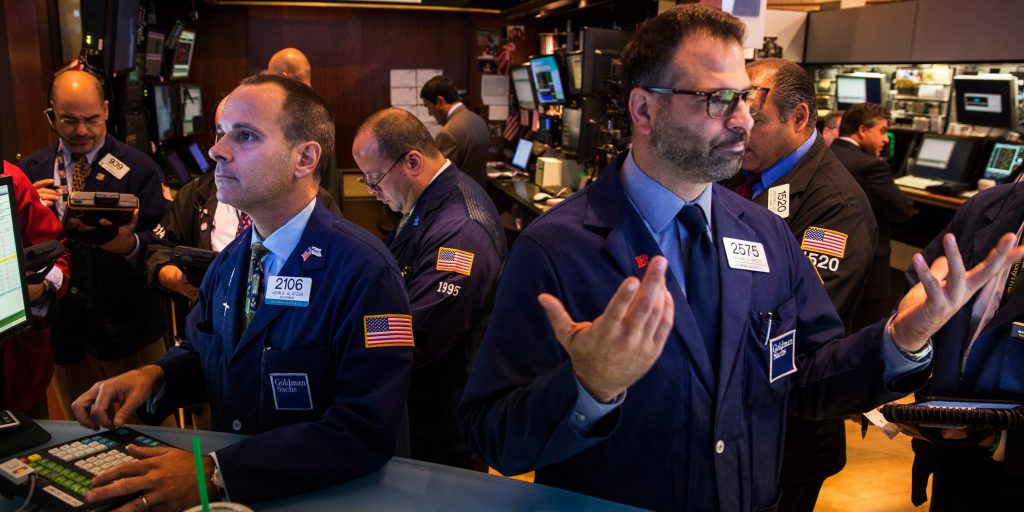- US stocks looked set to open higher Wednesday as the March inflation data showed some pressures are easing.
- Oil traded above $100 as Vladimir Putin vowed to continue Russia's war against Ukraine.
- European equities fell after UK inflation hit a 3-decade high of 7%, up from 6.2% last month.
US futures ticked higher Wednesday as inflation data wasn't as high as markets feared, with some perceiving the latest print as a sign that some price pressures may have peaked.
Futures on the Dow Jones rose 0.4% as of 4:00 a.m. ET. Those on the S&P 500 rose 0.5% and the Nasdaq rose 0.6%, suggesting a higher open later in the day.
Data on Tuesday showed overall US inflation rose to a 41-year-high of 8.5% in March, a solid jump from the 7.9% seen in the prior month, and just slightly above market forecasts for an 8.4% rise.
But a better measure of long-term inflation — the core CPI index — showed the prices of goods and services fell by the most in two years.
"US inflation might still be running hot, but since [Tuesday's] figure was 'only' 8.5% and not worse than feared, stocks have found room to recover," Chris Beauchamp, chief market analyst at IG, said.
That data sent US yields lower, pausing their recent march higher. The yield on the 10-year Treasury note was at 2.77% on Wednesday, compared to a more than three-year peak of 2.83% before the inflation reading.
"Markets may see some relief from early signs of easing price pressures as we near peak inflation levels, and with an aggressive 2.5% of Fed interest rate increases already expected this year," Ben Laidler, global markets strategist at investing network eToro, said.
"This may ease both the already hawkish forecasts of the Fed raising interest rates 2.5% this year, and the dramatic recent spike in US bond yields and the stronger US dollar," he added.
Market sentiment was curbed along with higher oil prices after President Vladimir Putin vowed to continue Russia's invasion of Ukraine, saying peace talks with Ukraine "are at a dead end."
Russia's oil and gas production has fallen to its lowest since July 2020 below 10 million barrels per day as sanctions hold back trade, Reuters reported, citing sources.
OPEC has told the European Union that it would be nearly impossible to replace 7 million barrels of Russian oil per day if supplies are cut off due to boycotts. On Tuesday, the group cut its oil demand growth forecast for 2022, citing the war in Ukraine, rising inflation, and the return of the COVID-19 flare-up in China.
"OPEC is showing zero signs of moving to fill the gap," said Jeffrey Halley, a senior market analyst at OANDA. "Only a return by Iran and Venezuela could do that."
Oil prices traded above $100 a barrel. Brent crude futures were last down 0.2% at $104.38 a barrel, and West Texas Intermediate fell 0.4% to $100.16 a barrel.
Elsewhere, UK inflation rose more than expected to hit a 30-year-high of 7% in March as rising food and energy prices weighed on consumers. That figure was up from February's 6.2%.
"The Bank of England will most definitely have been awaiting today's figures with bated breath, and the triple threat of sluggish economic output, listless wage growth and sky-high inflation we have seen this week means its monetary policy report and accompanying interest rate decision will certainly be one to watch come May," Derrick Dunne, CEO of YOU Asset Management, said.
London's FTSE 100 and the pan-European Euro Stoxx 600 each fell 0.1%. Frankfurt's DAX lost 0.5%.
Asian equities traded choppily after data showed China's exports outperformed, but its imports slumped slightly.
The Shanghai Composite fell 0.8% and Hong Kong's Hang Seng was about flat. Tokyo's Nikkei rose 1.9%.
